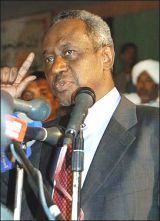Talk of genocide in Darfur ‘exaggerated’ – Sudan’s VP
Nov 13, 2005 (CAIRO) — The conflict in Sudan’s Darfur region is tribal and cannot be described as a genocide, Sudanese Second Vice President Ali Osman Taha said Sunday.
 “The conflict in Darfur is tribal and not a political issue or a question of genocide,” he said after meeting Egyptian President Hosni Mubarak.
“The conflict in Darfur is tribal and not a political issue or a question of genocide,” he said after meeting Egyptian President Hosni Mubarak.
“This issue was exaggerated at the international level, when in fact we are dealing with a typical situation which is very common in Africa,” he added.
The U.S. has branded as “genocide” the atrocities perpetrated by government forces and their Arab proxy militias against the black African population.
The UN, in a report earlier this year, stated that crimes against humanity were committed in Darfur but stopped short of accusing Khartoum of genocide.
In 2003, Darfur groups complaining of marginalization launched a rebellion which was violently repressed.
The combined effect of the war and a dire humanitarian crisis in the region has left up to 300,000 dead, according to a British parliamentary report. More than two million people were displaced.
Taha, who also held talks with Egyptian Premier Ahmad Nazif on Saturday, was visiting Cairo to sign several cooperation agreements.
On Saturday, the U.S. agreed on an exemption to its economic sanctions against Sudan, lifting a ban on the delivery of U.S.-made trains to aid the implementation of the north-south peace agreement, the Sudanese foreign minister said.
Foreign Minister Lam Akol Ajawin said the sanctions issue was one of the most important topics discussed on a visit to Washington earlier this month by First Vice President and southern leader Salva Kiir.
“In spite of the renewed sanctions, we have succeeded in persuading the U.S. officials to lift the ban on the export to the Sudan of American-made trains and locomotives,” he said.
He added the peace deal “requires a tremendous transportation capability which can be provided only by railways and due to the unavailibility of the spare parts, those trains are not operating at present.”
Taha argued that sanctions imposed on Sudan were partly responsible for igniting the conflict, by maintaining the population in a state of poverty and underdevelopment.
(AFP/ST)
